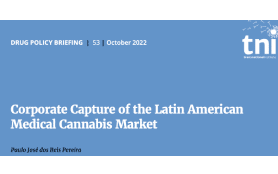31 October 2022
Policy briefing
This report analyses the role of transnational cannabis corporations in the context of the market created by the new regulations on cannabis for medicinal purposes in Latin America and the Caribbean.
Highlights
-
- More than a dozen countries in Latin America and the Caribbean (LAC) have promoted some form of regulation on the medicinal use of cannabis, following the global trend of relaxing the prohibition of the plant. Almost all of these regulations have adopted a for-profit commercial approach. This has created a multi-million market in the region covering the manufacture and sale of processed products, especially of CBD-based products, the most accepted active ingredient in the plant worldwide.
-
- Corporations based in wealthy countries, such as Canada, the United States (US), the United Kingdom (UK) and Israel, are setting up operations in LAC, usually via joint ventures and other forms of partnership with national companies, in order to obtain commercial advantages, either for growing cannabis at low cost to manufacture their products or for export, or for expanding their consumer market.
-
- This dynamic diminishes the potential social gains of regulations on medicinal cannabis. First, it creates unequal access to medicinal cannabis products based on income, so the poorest least benefit. Second, it tends to relegate countries in LAC to a subordinate position as exporters of cannabis raw materials. Third, it threatens the environment through large-scale production, lobbying for pro-profit regulations and the creation of patents that foster a market monopoly. This new market both tends to exclude traditional cannabis producers and other vulnerable social groups historically related to the illicit market while privileging large corporations. It also highlights the international articulations between corporate elites in the cannabis market and the dynamics of exploitation between the global North and South.
-
- Various other cross-cutting aspects exacerbate the problems of this corporate capture in the LAC medical cannabis market, affecting access to cannabis-based medicines and undermining the interests of small farmers and vulnerable social groups. These are: the standardisation of production, the patenting of products, and the environmental threat posed by the large-scale cultivation of cannabis.
- Regulations for medicinal cannabis should not reinforce the inequalities and violence historically associated with prohibitionist approaches, but should enable the majority to have access to health care, especially the most vulnerable. Countries should make effective provisions in their regulatory mechanisms that stress fair-trade principles that would protect such groups, especially traditional producers, in addition to expanding access to the range of cannabis products for medicinal purposes. A key step in this regard is to prevent the corporate capture of the new Latin American market for medicinal cannabis.
policybrief_53_web


















